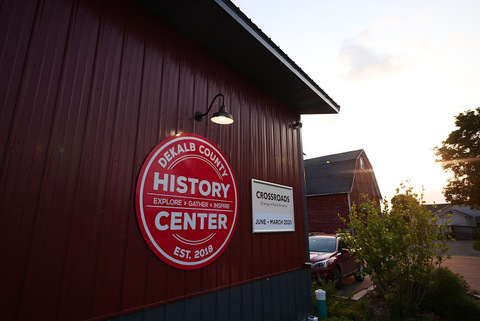Knowing local history is important for the community

The DeKalb County History Center’s logo is red and has white text on it. Understanding local history is important so that you can learn from the past. (Patrick Murphy | Northern Star)
April 28, 2023
In schools students are taught national and international history, but very rarely are they taught local history when it is just as important.
Knowing the history of the town you grew up in, are attending school in and/or are working in is an essential part of getting to know the community and how it came to be.
“Local history helps students better understand their community, as well as the inequities in education, poverty, health outcomes and other issues that they see around them every day,” according to Learning for Justice.
Most states in the U.S. have an education system that requires students to learn about how the country established itself as a democratic republic. If learning the history of the nation brings a sense of patriotism to the hearts of the students, knowing local history has the same effect.
“History makes loyal citizens because memories of common experiences and common aspirations are essential ingredients in patriotism. History makes intelligent voters because sound decisions about present problems must be based on knowledge of the past,” expressed the American Historical Association.
Just as students are told the horrors of the past so that they might not be doomed to repeat the mistakes, they should be told the stories of their community.
The origin stories of a town can help those in current leadership or voting roles make better informed decisions for the good of the community.
The DeKalb County History Center has vocalized the value of knowing the town’s history and hopes to bring the community together through the stories of ancestors.
“The DeKalb County History Center is committed to exploring the rich stories that are part of our county’s history; gathering people together through exhibits, programs, and research; engaging with people of diverse backgrounds to ensure they see themselves in our local history; and inspiring people to apply this knowledge to enlighten the decisions of tomorrow.,” according to the DHC’s website.
Additionally, the DCHC has recently introduced new programs that can help NIU students and community members get to know DeKalb a little better.
The Center is now free to visit on Saturdays, so there is little excuse for anyone to be ignorant of DeKalb’s history.
In addition to the DCHC, there are two other notable sources to learn DeKalb’s history, the Glidden Homestead and the Ellwood House Museum.
The Glidden Homestead is a historic home preserved in the hopes of teaching community members and visitors the history of Joseph F. Glidden and his invention of barbed wire.
“The Joseph F. Glidden Homestead and Historical Center is dedicated to telling an American story of migration, innovation and philanthropy at the site where Joseph F. Glidden invented ‘The Winner’ barbed wire,” claims the Glidden Homestead mission statement.
The Ellwood House Museum is just as it sounds, a beautiful home that has been preserved and turned into a museum.
The museum values integrity, education, stewardship and excellence, so visitors can be sure to get the best experience as they learn more about the local history.






